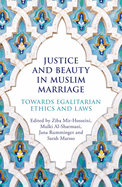
A groundbreaking collection of essays challenging the "patriarchal terrain of Islam," Justice and Beauty in Muslim Marriage: Towards Egalitarian Ethics and Laws, edited by Ziba Mir-Hosseini, Mulki Al-Sharmani, Jana Rumminger and Sarah Marsso, advocates persuasively for a dynamic, feminist approach to interpreting the Qur'an and other sources of divine guidance relating to women's rights within marriage. A diverse cohort of authors, professors and prominent feminists--drawing on scholarly reviews of the Qur'an, the Hadith (words and actions of Prophet Muhammad) and tradition and legal theory--contend that the core Qur'anic principles of justice and beauty within marriage, as manifested by love, compassion and mutual respect, are missing from the discourse of political leaders, preachers and jurists. Instead, they distort religion to justify misogyny and the subordination of women--in direct contradiction to the spirit of Islam.
In her essay "Reading the Qur'an Through Women's Experiences," Indonesian scholar Nur Rofiah lays the groundwork for a gender-sensitive, holistic reading of the Qur'an, centering women's experiences as a lens for interpreting the sacred text and honoring its underlying intent. Egyptian-German researcher Yasmin Amin's essay in the section titled "Lessons from the Prophet" reflects on the mutual respect and love that characterized the Prophet's relationship with his wife Khadija, a marriage model that Amin recommends resurrecting to improve the lived realities of contemporary Muslim women.
Justice and Beauty in Muslim Marriage is nothing short of revolutionary in demonstrating the compatibility of feminism within Islam and offers readers a thought-provoking immersion into the fledgling women's rights movement finding its wings across the Muslim world. --Shahina Piyarali, reviewer

